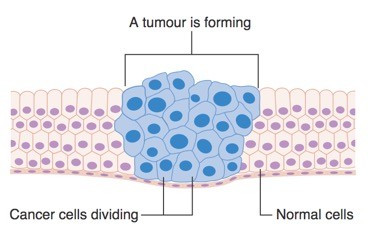
Contents
In this article we will look at:
- What is Cancer?
- How does Cancer Occur?
- Who is Prone to Cancer?
- What are the Symptoms of Cancer? How is Cancer Diagnosed?
- Diagnosis
- What are the Complications of Cancer?
- What is the Treatment for Cancer?
- Home Remedies for Cancer
You can click on any of the links above to navigate to the section of your interest.
What is Cancer?
Cancer is defined as the uncontrolled cell growth of abnormal tissues or cells that might happen anywhere in the body. The group of abnormal cells is referred to as “cancer cells.” These also go by the names like tumor cells or malignant cells. The cancer cells are able to infiltrate the surrounding normal body cells & tissues.
Frequently, it has been observed that cancer or tumor cells might break from the original mass of cells or tissue, travel across the lymph & blood systems, and find a home in other organs wherein they continue with the uncontrolled cellular growth. The process of the tumor cells leaving the source or origin and growing exponentially in other body parts or organs is referred to as “metastasis.”
How does Cancer Occur?
Any factor leading to the uncontrolled growth of cells or tissue in the body might cause cancer. There are several factors that have been linked to cancer development in the human body. Some of the causes of cancer are still unknown while other forms of cancer might be triggered due to lifestyle or environmental changes. Cancer might also develop due to more than one cause.
Here is a listing of the major causes of cancer as per the research advances:
- Toxic or Chemical Compound Exposures: Chemicals including benzene, vinyl chloride, asbestos, nickel, benzidine, cadmium, cigarette smoke or tobacco, and aflatoxin might cause cancer.
- Pathogens: HPV, EBV, Hepatitis viruses B & C, Herpes virus, Merkel cell polyomavirus, and other bacteria are under observation.
- Ionizing Radiation: Radon, Uranium, ultraviolet rays from direct sunlight, radiation from rays including alpha, beta, & gamma X-ray emissions
- Genetics: A great number of specific cancers are linked to human genes including breast, prostate, ovarian, melanoma, and colorectal.
Who is Prone to Cancer?
Anyone can be a victim of cancer.
The most common types of cancer in men, women & children are:
- Women: Breast, colorectal, and lung
- Men: lung, colorectal, and prostate
- Children: brain tumors, leukemia, and lymphoma
What are the Symptoms of Cancer? How is Cancer Diagnosed?
The signs & cancer symptoms usually depend on the particular type of cancer, its location, or/and where the cancer cells have spread. A few patients show no cancer symptoms or signs until cancer becomes far advanced. The American Cancer Society mentions different warning symptoms or signs that cancer might be there and you should seek medical attention. Here are some cancer symptoms to look out for:
- Sudden changes in the bladder or bowel habits
- A sore throat that refuses to heal
- Unusual discharge or bleeding
- Lump or thickening in the testicles, breasts, or anywhere in the body
- Difficulty in swallowing or indigestion
- Noticeable changes in the color, size, shape, or thickness of some mole or wart
- Consistent coughing or hoarseness in the voice
- Unexplained or sudden weight loss or no appetite
- Persistent vomiting, nausea, or fatigue
- New pain in bones or muscles
As of now, there are more than 200 types of cancer that are known to the mankind. However, there are specific general categories into which the different types of cancer can be grouped. Here are some depending on the cancer symptoms:
- Leukemia: This type of cancer originates in the blood-forming tissues like the bone marrow. As a result, several amounts of abnormal blood cells are formed and enter the bloodstream.
- Carcinoma: Cancer starting in the skin or tissues covering or lining the internal organs including skin, pancreatic, colon, lung, or ovarian cancers.
- Sarcoma: Cancers that originate in the cartilage, bone, blood vessels, cartilage, fat, muscle, or other types of supportive or connective tissues leading to bone & soft-tissue cancers.
- Central Nervous System Cancers: Cancers that begin in the spinal cord or tissues in the brain.
- Myeloma & Lymphoma: Cancer beginning in the cells belonging to the immune system.
Diagnosis
Some cancers get diagnosed during routine checkups or screening. A thorough physical examination & medical history along with the history of symptoms are the initial steps in diagnosing cancer.
Imaging observations are commonly used to help the physicians diagnose any abnormality in the body. MRI & CT scans, X-rays, and ultrasound are common techniques for examining the body.
What are the Complications of Cancer?
- Sudden weight loss
- Loss of appetite
- Nausea & persistent vomiting
- Body pain
What is the Treatment for Cancer?
The cancer treatment usually depends on the type & stage of particular cancer in addition to the cancer symptoms. In some patients, the diagnosis & treatment of cancer might happen at the same time when the cancer tissue is removed surgically.
Home Remedies for Cancer
Some of the common home remedies for cancer include consuming natural food items including broccoli, aloe vera, soybeans, grapes, green tea. There are natural treatments as well including consuming vitamins, acupuncture, and certain dietary supplements.

Related videos
Related articles
A brain tumour is a growth/lump in the brain which can be benign or malignant. It occurs when brain cells divide and grow in an uncontrolled way.
Also referred to as bowel cancer, rectal cancer or colon cancer, colorectal cancer is a kind of cancer which affects rectum and colon. Colon and rectum is basically a hollow tube which connects the small intestine to the anus.
Dialysis is a procedure in which the blood is filtered mechanically without the help of the kidneys. If the kidneys are not functioning properly then Dialysis will take over the function of the failed kidneys.

